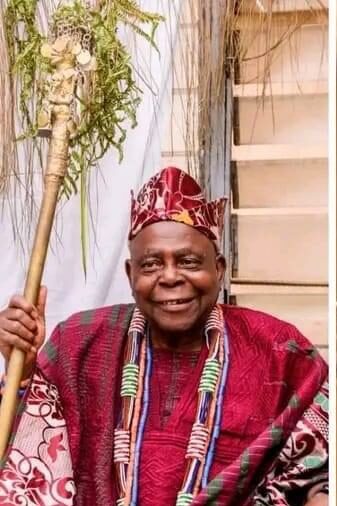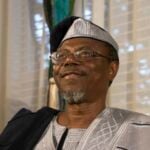PART 1
ORGANIC INTELLECTUALS
There is a high number of intellectuals based outside of the university system. The Yoruba have produced many of them since the nineteenth century. Almost twenty-three years ago, I published a book, Yoruba Gurus: Indigenous Production of Knowledge in Africa, to reflect on a handful of them. Many do not use print media but stay within the boundaries of orality. The significance of their work is impressive.
As clearly demonstrated in Yoruba Gurus, the concepts around the ideas of intellectualism transcend the walls of universities. In fact, many of the known world changers in antiquities have emerged, not only within laboratories or the leaves of books but also some points of discoveries and depth of enlightenment gained from their continuous career and skill engagements. Hence, while the world respects academic scholars in discourses around sensitive issues, organic intellectuals who have climbed the ladders of authority give more practical insights into the array of discussions. This is the position High Chief Ifayemi Osundagbonu Elebuibon has occupied in the Nigerian and Yoruba metaphysical discourses and epistemologies.
The crust of African intellectualism was built from organic sources, and this made it difficult for the early missionaries and colonial explorers to understand the intellectual holdings of the continent and its people with diverse cultures. Really, African educational and academic systems that predated colonialism and European invasions can be appreciated, but some include technical knowledge and wisdom passed along professional lines. For instance, the concepts of theoretical physics may not be well understood if the bounds of that discipline are held strictly. However, old African knowledge of physics is seen in experimental and professional developments. You might not be able to do something without being an outright performer of the same.
Hence, an African scientist is a professional in the area of science that a modern scientist would have wanted to expand. For instance, you are better appreciated as a political scientist if you have not been within the folds of politics, and society would also help to draw you closer to the said profession. Medicine, for instance, flourished in Africa, and the development of much medical knowledge in Africa did not come from the galleries of stand-alone research, but trials and errors, as well as long years of discoveries and new cases, have brought about tweaks to medical practises. Hence, with the advancement in pedagogy, intellectualism, and scholarship, one must not be distracted by seemingly new methods but must grasp the travails and prevalence of organic intellectualism to fill in the gaps that could have been discovered in the scholarly cultural comparison.
Africa is a dynamic continent. Its greatness lies not only in the abundance of its landscape and resources but also in the diverse cultures and traditions seen in its people at all times. The untapped potential of the large numbers that form the population makes it stand tall with strength, innovative abilities, creativity, and the unifying spirit of its people that transcends the borders of nations. An inspiration to those who understand this dynamic. The world has witnessed the greatness of the second-largest continent many times, from its savannahs to the rainforest and desert in the Sahel. The continent has greatly contributed to humanity.
The silent forces undisclosed to many that drive this progress and resilience seen today can only be attributed to the host of organic intellectuals that the continent harbours. This variant of intellectualism is so unique that no other part of the world seeks to compete with it. This is not to say that Africa maintains a monopoly over the phenomenon, but the intellectual and epistemological understanding of the continent is married to organic intellectuals, and, in comparison to the preponderance in other cultures, it takes the lead. Despite the shortfalls that marred the geometric sequence of growth, Africa still boasts organic intellectualism that is deeply rooted in the local pearls of wisdom, cultures, beliefs, and local experiences of fellow Africans. It is an inclusive aspect of African existence that taps its resources from within. Making it easier to adopt, unlike formal education, which’s embedded in premeditated syllabuses and curricula unknown to the majority.
Due to the large divergence, Africa is rich in culture and cultural elements. Even at that, the unity in diversity here is second to none. This explains why diverse experiences frequently have common ground, passing the same message and value. Organic intellectualism is visible in every aspect of African existence. This has allowed the reengineering and rebalancing of African knowledge systems and understanding to be easy as well as necessary. For instance, the practice of communal cohabiting and the promotion of extended family lifestyles are a result of the wisdom of organic practises. This wisdom to have family members of various age groups cohabit in large compounds has numerous benefits. Apart from the practical purposes of shared responsibilities and resources, communal existence also fosters social benefits that allow younger relatives to tap into the wisdom of their elders through the transmission of values, cultural beliefs, skills, knowledge of medicine, religion, and interpersonal skills from the former to the latter. This bolsters interconnectivity within the family unit, where the knowledge acquired shapes individual interactions with others. A blissful experience from the far cry we have today, where formal institutions have taken the bulk of family time and lifestyles, modern kids now have issues relating to their heritages.
The family has always been a school, and the passing of the encoded knowledge within the family ethos and subscribed trades grows different individuals to drive out reasonable examples for discourses on organic intellectualism. Ifa priesthood, blacksmiths, agricultural science, and other sciences that, today, need to be learned in lumped-up years of continuous assessments and laboratory experiments are informally injected into the social bloodstream of every African child.
Ifa and the practices around it have posed challenges that are difficult to understand for those who try to view it through the lenses of modern science or objective texts of social or scientific formulas. This is because it is science, philosophy, history, metaphysics, and other systems embedded in one. Its complexity and influence on the ideological subscriptions of Africans have made it difficult to discard. It has proven to be a knowledge system that is not taught in schools but by professionals who have learned the wisdom of divinity, especially from the cultural hands-downs of families who have shown the science and logic in it. Like the error the early modern intellectuals ran into, it would be easy to discard the practices because of their non-conformity with the test of modern and global science, but approaches to organic intellectuals that have both a scientific and mythical understanding of Ifa science and research have been able to explore the unexhausted particularities of its relevance.
From the above, one would see how African wisdom has rested much on organic intellectuals, but the question now is, how has Africa fared in contemporary knowledge distribution? As posited earlier, organic intellectualism is not geographically limited or time-bound; it is a phenomenon that grows and expands with age, space, time, and profession. Every profession has organic intellectuals, and their relevance will always be appreciated by many of scholars in academia. African concepts of organic intellectualism and intellectuals persist today, and the social systems, as seen everywhere, grow.
The relevance of African organic intellectualism impacts the immediate environment. The fields of agriculture and healthcare are two ways in which African wisdom and knowledge have been impacted. Through many generations, African farmers have been able to combat problems of food scarcity through the adoption of agroforestry. A system that allows the co-cultivation of food crops, trees, and even animals on land. This practice is very popular in Africa, especially in the semi-arid areas of West Africa. This approach allows for the conservation of resources, diversifying crop yields, and enhancing food security. The interesting aspect of it all is the wisdom displayed by these farmers to draw from local knowledge in adapting to the specific needs and conditions of the community. The health industry has also fared well through local knowledge. The adoption of local healing methods, herbs, and roots to care for sick-born health services that meet the specific needs of the community has further reduced the hardships of accessing good healthcare, as most healing materials can be accessed easily. The various practices are still evident in the local societies, but the influx of modern technologies and techniques without looking for inward approaches towards solutions is exhumed by these organic intellectuals.
One other modern dynamic is the fact that many of the African organic intellectuals do not form the folds of high-level scholarships; they do not have doctorate degrees, and some have not been able to even get any degrees. This has thwarted their possibilities of climbing the needed social ladder of influence that would make their opinions count. Going through a huge part of Northern Nigeria, one would see different ways in which agriculture is being practised, and several of the locals have acquired real knowledge that could form global agricultural changes. This applies to other sectors of African societies, and the country is not making efforts to expand the gems of knowledge these people hold.
Where local content and raw professionalism meet opportunity, society tends to enjoy top-notch knowledge without reserves. This brings about the Toyin Falola Interviews’ attempt to use public history to narrate African knowledge through raw organic intellectualism. Many African cultures have been explained from the vantage points of books, documentaries, and research that has gone through global methodologies, but there is a need to take a pause and call in major partakers of the phenomenon to understand the real state of things. In this effort, the series has invited High Chief Ifayemi Osundagbonu, Elebuibon, to move discourses about African metaphysics forward.
Elebuibon has been able to distinguish himself as one of the resource points in African metaphysics and epistemologies and has married practises with need. As a priest, author, poet, linguist, and even an artist, he has been able to make remarkable attempts at creating African consciousness. Elebuibon’s films and plays have been met with accolades as one of the closest links to originality and raw African knowledge. He exudes knowledge as it is or should be, not merely knowledge as observed, which kills history. This has informed the decision of the Toyin Falola Interviews to invite him to discuss Ifa and Yoruba metaphysics on December 3rd, 2023.
Please join us for a conversation with the world-famous Ifa priest, writer, poet, author, and linguist, High Chief Ifáyẹmí Ọ̀ṣúndàgbonù Elebuibon.
Sunday, December 3, 2023
5:00 PM Nigeria
10:00 AM Austin CST
Register and watch:
https://www.tfinterviews.com/post/elebuibon
Join via Zoom.
https://us02web.zoom.us/j/82667830176
YOU SHOULD NOT MISS THESE HEADLINES FROM NIGERIAN TRIBUNE
GAMA: Peter Obi bags Politician of the Year award
The event, themed “A Channel of Hope Where There is Despair,” celebrated individuals making positive impacts on…
Catholic Priest remanded for raping, impregnating teenage girl in Anambra
An Awka Children, Sexual and Gender-Based Violence Court of Anambra State, has remanded a Catholic Priest, Rev. Fr. Nwaigwe Stephen to…
Discontent spreads over succession plots at Supreme Court
As Nigerians wait on the National Judicial Council (NJC) to make final pick for the Supreme Court bench, fresh claims have emerged to explain the lopsidedness in…
I was forced to pay N1m, buy iPhone 14 Promax for marrying Sheila a virgin — Israel DMW
Davido’s Logistics Manager, Israel Afeare, who is popularly known as Israel DMW, claimed that his estranged wife’s parents “forced” him to…
HID asked monarch, other visitors to leave few minutes before death — Awolowo Dosumu
At the church service held at the in-house chapel of the Awolowo family house, Ikenne-Remo, Ogun State, Dr Awolowo Dosumu recalled how…
Bangbet Risk-free Starting: Nigeria’s Most Generous Betting Site Reveals
The world of online betting has been transformed by innovative platforms like Bangbet. With its user-centric design, the Bangbet app promises…






